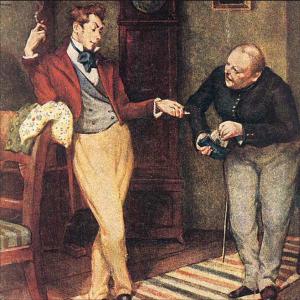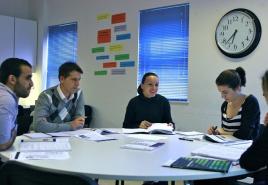What does the preposition mean. Does the preposition "for" count as a word
As you know, the Russian language is incredibly rich both from a lexical and morphological point of view. That is why foreigners have to spend far more than one year studying at least his oral speech with all the grammar and syntax. And, like any other language, in addition to independent parts of speech, it also needs auxiliary parts for linking words in a sentence, convenience of declension, and the correct formulation of questions. Therefore, in this article we will analyze one of these categories, namely: what is a preposition, why is it needed and how to use it correctly.
Concept and definition
As mentioned earlier, prepositions belong to the service parts of speech and serve to connect words in a sentence. More precisely, they express the dependence of nouns, pronouns and numerals on other words. Thus, they can show a relationship either between two objects (cloth with a pattern), or between an action and an object (go to the pier), or between a feature and an object (the most beautiful in the class). Prepositions differ from unions in that they connect words strictly within a simple sentence; the exception to their use are homogeneous terms, but otherwise their function is extensive. Their similarity with other service parts of speech lies in the fact that their properties are limited, we will talk about this later.
Properties of prepositions as parts of speech
Firstly, they cannot act as independent members in a sentence and are always attached to the word with which they are used, being an integral member with it. For example, in the sentence “The full moon was reflected in the river”, the preposition “in” along with the word “river” is emphasized as a circumstance. Secondly, since we found out what a preposition is, it, like other auxiliary words, cannot be changed by case, gender, tense and numbers, unlike the parts of speech with which they are used. However, they are always included in the question when declensing nouns, pronouns and numerals in cases and even help to do this, simplifying the task for students. For example, let's try to decline the word "mother".
- I. p .: Who is standing at the stove? - Mother.
- R. p .: Who has a new dress? - Mom.
- V.p.: Whom does daddy love? - mom.
- D. p .: I will go to whom for advice? - to Mom.
- T. p .: Grandmother is proud of whom? - mom.
- P. p.: I will write poems about whom? - about my mother.
Location in the offer

In addition, in order to understand what a preposition is as a part of speech, you need to learn how to quickly find them in the text. Most often they are adjacent to nouns and pronouns, and therefore are placed before them. For example, on the desk, at the table, in front of me, etc. If there is a definition (adjective, numeral, possessive pronoun, participle) before the word with which they are used, then the preposition “skips” it forward and stands in front of it. For example: on a wooden desk, at my table, for a long time, etc. However, there are some phrases in which prepositions are used after the word to which they refer. These are either well-established phrases or stylistic features of the author. For example: what for.
Classification of prepositions

For the convenience of studying morphology, all parts of speech are divided into types, types, categories according to some unifying feature. A similar division exists in the case of function words, this helps to better understand what a preposition is in Russian and why it is used.
So, there are 3 classifications of this part of speech.
Firstly, by origin, prepositions are divided into non-derivative (“primordial”, i.e., initially refer to function words: to, from, on, under, for, for, etc.) and derivatives (were formed from another part speech). The latter, in turn, can be verbal (thanks to, later, despite, despite), denominative (due to, during, in continuation, in view of, like, due to) and adverbial (inside, near, behind, ahead).
Secondly, in terms of composition, there are simple (they consist of one word and have one root: to, on, from, for), complex (several words: during, despite) and compound (one word, several roots) prepositions (examples : from under, from behind).

By semantic meaning
This classification of prepositions is the most capacious, it includes 6 main categories:
- Spaces or "places" (with a defined word answer the question "where?"): in the table, outside the window, on the carpet, under the closet.
- Time - "when? how long?: for half an hour, from morning to night, for a week.
- Object - “about what? about what / who? ”: write about love, talk about school.
- The mode of action is “how?”: with feeling, with love, with anxiety.
- Reasons - “why?”: out of boredom, out of shame, out of fear.
- Goals - Why? for whom? ”: for pleasure, for mom.
Theme Subtleties

So, we have studied what a preposition is and how it is classified by structure, origin and categories. For those who have not yet fully understood the complexities of this part of speech, we will explain some tricks. So, for example, a rather difficult topic: what is a derivative preposition and how to distinguish it in a sentence. A question will always serve as an assistant in this, since it can be asked to an independent part of speech, but not to a service part. For example, in the sentence: "There were many bends in the course of the river," the second word is a noun ("where? - in the course"). In the other case (for an hour I could not sleep) it is a preposition, since a single question is asked to the expression ("how long? - for an hour"). From here, another difficulty arises, namely, it is necessary to correctly determine how prepositions are written - with “E” at the end or with “I”. To do this, you will have to learn them by heart: during, in continuation, as a result, but subsequently.
The preposition "for" is a word. All parts of speech in Russian are divided into two groups: service parts of speech and independent parts of speech. The preposition "for" is not a word. All parts of speech in Russian are divided into two groups: official and independent.
Service parts of speech
Service parts of speech are service words that do not have syntactic independence. That is, a sentence consisting of them does not carry any semantic load. There are several service parts of speech.
- Prepositions. Used for expressions of grammatical dependence in a phrase. Examples of prepositions: in, with, to, because of, from under, in consequence, despite, and so on.
- Unions. They combine simple sentences into complex ones. They are of two types: subordinating and coordinating. Subordinating conjunctions connect two simple sentences in the NGN. In this case, from one sentence, you can raise a question to another, and we have a dependent and main sentence. Examples: when, to, how, what, because, and so on. Coordinating conjunctions connect two simple sentences in the SSP. Thus, we get two equal proposals in which it is impossible to put the question from one to the other. Examples: and, yes (=and), but, but (=but), or and so on.
- Particles. It introduces various semantic shades, and also helps in creating new forms of words. Examples: far from, would, not at all, even, the same, and so on.
Independent parts of speech
Independent parts of speech are words that denote an object, their signs and their actions. They are divided into:
- Nouns. Designate an object. Answer the question (Who? What?). Examples: ball, apple, marshmallow, jury.
- Adjectives. Designate an attribute of an object. They are complete and short. Full adjectives answer questions (Which one?). Short adjectives answer the questions (What?). Examples: short, soft, deep.
- Verbs. Denote the action of the subject. There are perfect ones that answer questions (What did you do?), And imperfect ones that answer questions (What did you do?). Examples: managed, won.
Pretext- this is the service part of our speech, which expresses the semantic connections between nouns, numerals and pronouns and other words in sentences or phrases: I went to school, climbed a mountain, ran down the street, approached my father.
Prepositions in Russian, like other service parts of speech, do not change and always remain in the form in which they exist: in the middle, in half, on, with. Also, prepositions are not members of a sentence, but when parsing a sentence, prepositions are underlined along with the member of the sentence to which they belong: After brief hesitation the animal came up to me (after hesitation- a circumstance to me- circumstance).
Prepositions, particle conjunctions- these are service (non-independent) parts of speech. Despite this, they have their own classification and are divided into certain types.
types of suggestions.
According to morphological features prepositions can be divided into three types:
- Simple prepositions- prepositions that consist of one word that has one stem: on, in, by, to, with, from, over, about, after, before, thanks to and etc .
- Compound prepositions- prepositions that consist of one, but have two roots and are written with a hyphen: from under, from behind, over and etc.
- Compound prepositions are prepositions that consist of two or more words: during, during, in spite of, in spite of, in spite of and etc.
The origins of prepositions are:
- Non-derivative prepositions- these are ordinary prepositions that cannot be associated with formation from any part of speech: from, to, into, at, to, by, from, beyond and many others. Non-derivative prepositions also include compound prepositions: over, from behind, from under.
- Derived prepositions- these are prepositions formed from other parts of speech (nouns, verbs, etc.): during, in the course of, in spite of, in view of, like and etc.
Derivative prepositions.
Derivative prepositions are several types that depend on the part of speech with which the formation of the preposition is associated:
- Denominative prepositions are prepositions formed most often from nouns. The formation of such prepositions can occur with the help of adverbs or directly on behalf of the noun. The denominative prepositions include the following: by virtue of, in contrast to, during, like, in view of, due to, in continuation, in contrast to, and others. Noun with preposition or suggestion?
- Verbal prepositions are prepositions that are formed from gerunds: despite, including, thanks to, after, later, despite, etc. How are prepositions different from conjunctions? Or another part of speech?
- Adverbial prepositions are prepositions that come from adverbs: behind, in front, about, inside, near, around, except, in spite of, etc.
Prepositions and case agreement.
Prepositions can be used with one or more forms cases. At the same time, there are prepositions that require control in some specific case: according to - dative, because of - genitive, and in - prepositional and accusative:
According to the schedule, according to the schedule; because of the rain, because of the mother; in the Crimea, in the Crimea.
Classes of prepositions on a lexical basis.
A preposition can express:
- Time relation: jump from morning to evening;
- Spatial relation: visit St. Petersburg and Baikal;
- Compare and match relation: as tall as me, something like a flash;
- Escort attitude: take with you, come with your brother;
- Reason relation: weep with grief;
- Object relation: forget about the rest, talk about the wedding;
- Target relationship: dress for going out; food for the holiday;
And other ranks.
How to do a morphological analysis of a preposition?
Suggestion parsing plan:
1) Part of speech, the purpose of this part of speech;
2) Type of preposition: simple, compound or complex;
3) Type of preposition: derivative or non-derivative;
4) What word does it refer to;
5) In what case is controlled in the sentence (phrase);
6) The category of a preposition on a lexical basis.
An example of the morphological analysis of a preposition.
Two people stood on the porch: he and with him.
On the porch)- a preposition, serves to connect words in this sentence, simple, non-derivative, refers to a noun "porch", used with a prepositional case, has a spatial-objective relationship with a noun.
With him)- a preposition, serves to link words in a sentence, simple, non-derivative, refers to a pronoun "him", used with the instrumental case, has the meaning of accompaniment.
Where is Kolobok sitting? On a stump. Preposition NA.

Rice. 6. Gingerbread Man ()
Who is the dog friends with? With cat. Suggestion S.

Rice. 7. Dog with a cat ()
What is the ship sailing on? By sea. PO preposition.

Rice. 8. The ship sails on the sea ()
Where is the student sitting? At the desk. Suggestion FOR.

Rice. 9. The student at the desk ()
Let's remember the prepositions : in, without before, from, to, on, by, o, from, before, with, through, for, with, at, for, over, about, under, about.
Unlike nouns, adjectives, and verbs, prepositions do not answer questions. However, the connection of words in a sentence without prepositions is impossible.
Let's remember:
Prepositions with words are written separately.
We already know that there are similar prefixes in Russian. But prefixes - this is part of the word, so they are written together with the words. A prepositions - this is a part of speech, so they are written with words separately.
Let's learn how to distinguish a prefix from a preposition.
Let's determine where the prefix is, and where is the preposition.
(On) wrote (on) an envelope.
The first way: you can discard or change the prefix, but not the preposition. Let's try:
Wrote (on) an envelope. The words are connected in meaning. So the first NA is a prefix.
Wrote an envelope. Communication is broken. So the second ON is a preposition.
Posted by- ON the prefix - we write together. On the envelope- ON the preposition - we write separately.
Remember: prepositions with verbs are not used!
Consider the second way:
(Pro) read (pro) animals.
The second way: you can insert another word between the preposition and the word. Let's try:
Read - What did you do? - this is a verb, PRO is a prefix, you cannot insert another word.
Read about pets. PRO - an excuse, we will write separately.
Read about animals.
Word pretext translated from Greek means " before the word". In terms of frequency of use, prepositions take the fourth place after nouns, verbs and adjectives.
Let's consolidate the acquired knowledge in practice.
Let's play with suggestions.
The name of which coniferous tree consists of four prepositions?
Pine - C, O, C, ON.

The name of which pet consists of two prepositions?
Cat - K, OT.

The name of which pet consists of three prepositions?
Goat - K, O, FOR.

Without what four excuses can you not inflate a wheel?
Pump - ON, C, O, C.
Let's compose and write down phrases with prepositions B, ON.
Sweets, vase;
Books, shelf;
Painting, wall;
Tablecloth, table;
Pencil, pencil case;
Cubes, box.
Let's check:
Sweets in a vase;
Books on the shelf;
Picture on the wall;
Tablecloth on the table;
Pencil in a pencil case;
Cubes in a box.
Insert suitable prepositions:
Birds ... in a cage.
Leaves ... branch.
Cat ... table.
Kindergarten ... corner.
Let's check:
Birds in a cage.
Leaves on a branch.
The cat is at the table.
Garden around the corner.
Prepositions with words are written separately.
Let's write, opening the brackets:
Misha (in) ran (in) class.
Vova (before) rode (to) school (on) a tram.
Nina (along) walked (along) the path (to) the garden.
The path (c) started (c) the mountains.
Flowers (under) the window (under) cut (under) the root.
Let's check:
Misha ran into the classroom. Misha What did you do? ran in. Ran in - this is a verb, so B is a prefix, we write together. I ran into a large class. You can insert a word, so B is a preposition, we write separately.
Vova went to school by tram. Vova What did you do? arrived. I arrived - this is a verb, which means DO is a prefix, we write together. I arrived at my school. You can insert a word, which means DO is a preposition, we write separately. I arrived on the red tram. You can insert a word, which means DO is a preposition, we write separately.
Nina walked along the path to the garden. Nina what did you do? went. Went - this is a verb, so software is a prefix, we write together. On a small path. You can insert a word, which means software is a pretext, we write separately. In the city garden. You can insert a word, so B is a preposition, we write separately.
The path descended from the mountain. Path what did you do? went down. Went down - this is a verb, so C is a prefix, we write together. Coming down from a high mountain. You can insert a word, which means C is a preposition, we write separately.
The flowers under the window were pruned to the root. Flowers under my window. You can insert a word, which means POD is a pretext, we write separately. what did they do? Cut off - this is a verb, which means POD is a prefix, we write together. Cut to the very root. You can insert a word, which means POD is a pretext, we write separately.
In this lesson, we learned that a preposition is a part of speech that serves to connect words. It must be remembered that prepositions with words are written separately.
- Klimanova L.F., Babushkina T.V. Russian language. 2. - M.: Enlightenment, 2012 (http://www.twirpx.com/file/1153023/)
- Buneev R.N., Buneeva E.V., Pronina O.V. Russian language. 2. - M.: Balass.
- Ramzaeva T.G. Russian language. 2. - M.: Bustard.
- Festival of pedagogical ideas "Open Lesson" ().
- Social network of educators Nsportal.ru ().
- Klimanova L.F., Babushkina T.V. Russian language. 2. - M.: Enlightenment, 2012. Part 2. Do ex. 158, p. 113; ex. 161, p. 115.
- Make up 4 tests with three answers on the topic of the lesson.
- * Using the knowledge gained in the lesson, make up a few riddles following the example from the section This is interesting.
A preposition is a service part of speech that expresses the dependence of nouns, numerals and pronouns on other words. Example of a sentence with prepositions (prepositions are underlined): I will on work With morning before evenings By weekdays.
Morphological features
Prepositions can express various relationships:
- Spatial: go along the road, go onto the road;
- Temporary: get up in the morning, go for the summer;
- Causal: a mistake due to inattention, complains of illness.
Suggestions are divided into:
- simple - consisting of one syllable (in, on, by, to);
compound - consisting of two or more words (despite starting with); - non-derivatives: without, in, before, for, for, from, to, on, over, about, about, from, by, under, before, with, about, with, at, through;
derivatives - formed from independent parts of speech with the loss of their meaning and morphological features: about, as a result, due to, etc.
Derivative prepositions are often used with one case. Non-derivative prepositions can be used with different cases. Prepositions thanks to, according to, contrary to are used with the dative case. The preposition thanks is not used when talking about causes that cause negative consequences. You can't say "Due to the snowdrifts, traffic is interrupted."
The use of prepositions in and on may depend on which noun they are combined with: ride a train - ride a tram, work in a team - work at a factory, go to the Crimea - go to the Caucasus, etc. The prepositions in and on have antonymous prepositions from and with: go from school - go to school, take from the shelf - put on the shelf.
Do not confuse prepositions with homonymous parts of speech:
- opposite the house (preposition) - I live opposite (adverb), ahead of the detachment (preposition) - go ahead (adverb);
- thanks to the rain (preposition) - thanks to the hostess (general participle), despite the illness (pretext) - not looking around (general participle);
- about work (preposition) - put on a bank account (noun), within a day (preposition) - during the river (noun), due to bad weather (pretext) - keep in mind (noun).
Prepositions do not change (there are no non-permanent morphological features).
Examples of prepositions
Simple prepositions
Thanks to my father, my sisters and I know French, German and English (A. Chekhov).
Against my wishes, they met (V. Garshin).
A mutual friend from the Baltics came to visit us for the weekend.







